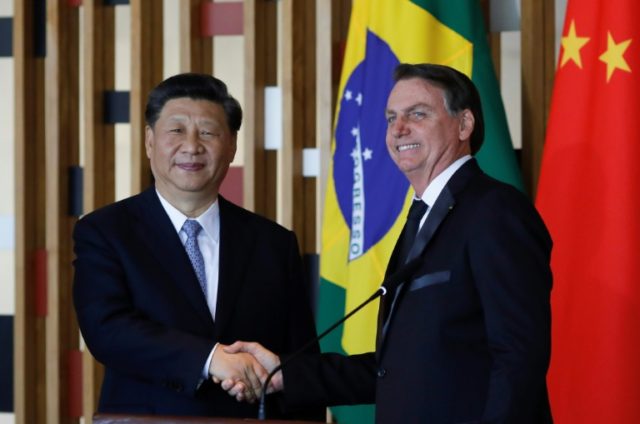Brazilian President Jair Bolsonaro met with Chinese dictator Xi Jinping at the BRICS regional summit in Brasilia on Wednesday to discuss increased trade between the two countries. Some analysts worried such an expanded relationship could have a negative effect on Brazilian industry.
Chinese state-run media was all smiles after the meeting, as with the relentlessly upbeat report from the Xinhua news service:
At the recently concluded second China International Import Expo (CIIE), the transaction volume of Brazilian businesses grew 3.6 times compared with that at the first CIIE last year, Xi said, calling the results gratifying.
As the largest emerging-market country in the eastern and western hemispheres, respectively, Xi said, China and Brazil share broad common interests.
China is optimistic about Brazil’s development prospects and fully confident in bilateral cooperation, Xi said, adding that China stands ready to share development experience and gains with Brazil, so as to achieve common prosperity.
Xi expressed willingness to work with Bolsonaro to properly grasp and guide the direction of the development of China-Brazil relations.
China and Brazil are both major countries and the two sides should maintain strategic focus, adhere to mutual respect, treat each other as equals, strengthen exchanges and cement mutual trust, Xi stressed.
He urged both sides to open markets to each other and explore ways to establish long-term, stable and direct supply channels for basic products, including agricultural products, iron ore and crude oil.
China Daily celebrated 45 years of growing trade between Brazil and China, finding great significance in Xi’s second meeting with Bolsonaro in less than a month, the first having been Bolsonaro’s visit to China in October.
Chinese ambassador to Brazil Yang Wanming said the two countries are “highly complementary in resources, markets, needs and consumption,” producing a growth trend in bilateral trade that overcame “the impact of deteriorating global trade.”
Yang pointed to $80 billion in Chinese investments spread over 300 different enterprises in Brazil. He noted these investments have moved beyond mining and agriculture to encompass “ diverse portfolio including but not limited to energy, electricity, manufacturing and technological innovation.” He also talked up the possibility of China’s Belt and Road infrastructure initiative merging with the analogous Brazilian Partnerships and Investments Program.
A China Daily op-ed on Thursday by Brazilian Undersecretary for Foreign Investment Renato Baumann touted a “golden opportunity” for China and Brazil to increase trade at the BRICS summit and through the upcoming relaunch of the Sino-Brazilian High-Level Commission.
“Brazil, like other economies in Latin America, has been experiencing low growth for quite some time. Furthermore, in all these cases there is an excess demand for investment in infrastructure, a basic condition to foster growth. China, at the same time, has become one of the most important sources of resources, eagerly looking for opportunities to invest. As an outcome of this matching of demand and supply, China has become one of the most important investors in the region,” Baumann wrote.
Brazil’s O Globo sounded a more cautionary note, warning that a free trade zone with China could bring benefits such as new technologies and access to the immense Chinese consumer market, but could also harm Brazilian industry.
Mizuho Bank strategist Luciano Rostagno warned that if Brazil opens its economy “overnight,” industries that have experienced protectionism and “misguided economic policy” could suffer a crushing impact. Rostagno and others advised careful negotiation over tariffs and structural changes would be required to safely create a free trade zone with China comparable to Brazil’s relationship with the European Union.
Al Jazeera noted Bolsonaro was highly critical of China last year, leading to the worst relationship crisis between the two countries in decades. “The Chinese are not buying in Brazil – the Chinese are buying Brazil” was a warning Bolsonaro issued repeatedly.
Brazil also has disagreements with Chinese policy on some regional issues, most notably the political crises in Venezuela and Bolivia, but Bolsonaro seems willing to put these disputes on the back burner in the interest of boosting trade with China. The South China Morning Post on Thursday quoted him saying China “is becoming more and more part of Brazil’s future.”
“Bolsonaro – an ardent admirer of U.S. President Donald Trump with whom he shares a contempt for multilateralism and left-wing ideology – has been under pressure from Brazil’s powerful beef, farming and mining sectors to stay on good terms with China,” the SCMP observed.

COMMENTS
Please let us know if you're having issues with commenting.